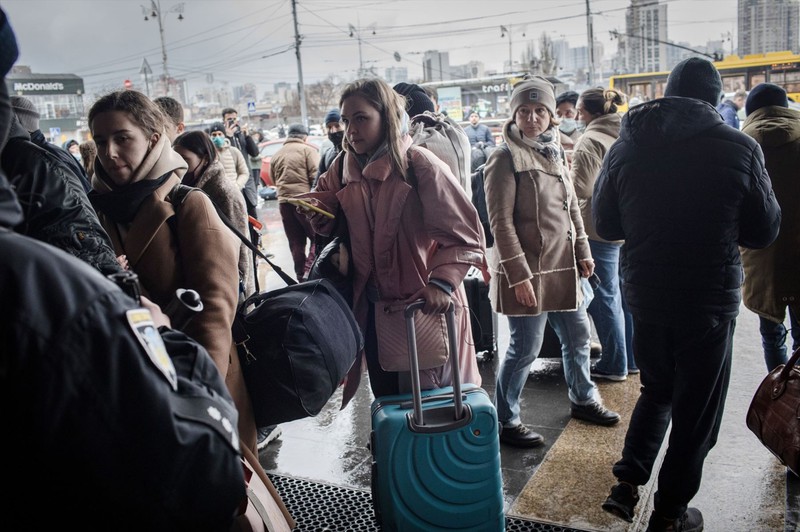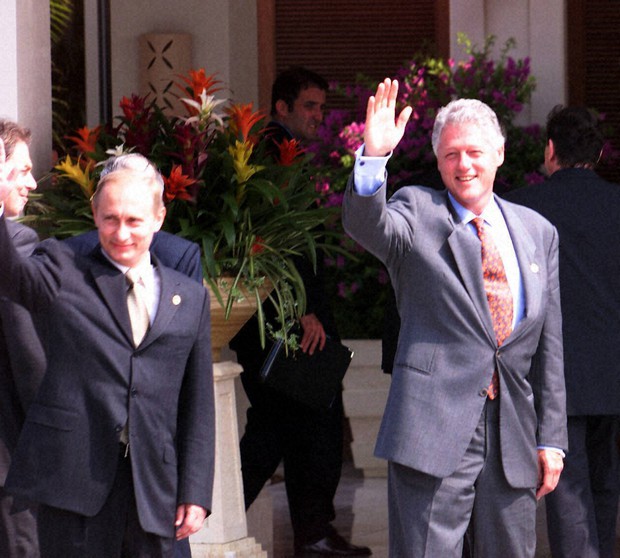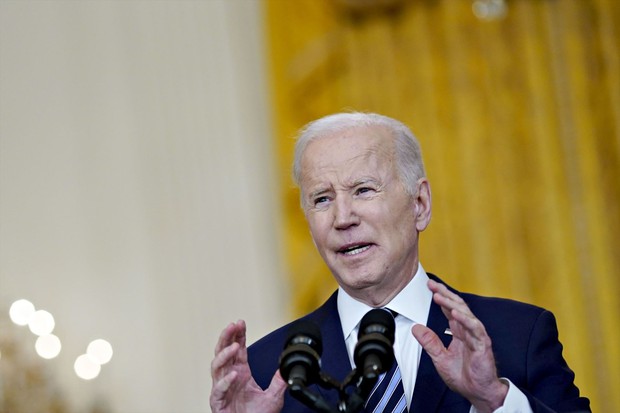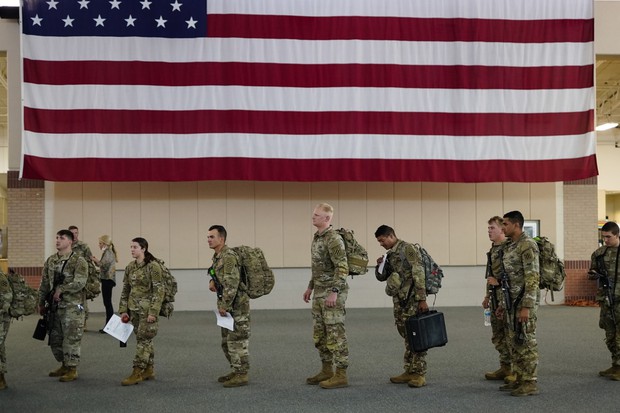What triggered the Russian invasion of Ukraine?
Part 2
Miscalculation - the consequences of the United States and NATO ignoring Russia in diplomacy
by Nozomu Nakaoka
Author: Nozomu Nakaoka
After graduating from International Christian University in 1971, working as an editorial board member of The Bank of Tokyo (currently Bank of Tokyo-Mitsubishi UFJ) and Toyo Keizai Inc., he is a freelance journalist. He is a Fulbright journalist from 1980 to 1981. He is a part-time lecturer at International Christian University, Japan Women's University, Musashi University, and Seikei University. He has served as a visiting researcher at Harvard University's Kennedy Graduate School of Political Science, a visiting professor at Washington University (St. Louis), a professor at Toyo Eiwa Jogakuin University, and a vice president of this university after that. His books include "American Conservative Revolution" (published by Chuokoron-Shinsha).

People evacuating Kyiv — Bloomberg
In Part 2 of "Who triggered the invasion of Russia and Ukraine," an extra edition of "America that Japanese people do not know," we will discuss American leaders' response to Russia's diplomacy and Ukraine issues from the era of President Clinton to President Biden. If you want to read Part 1, click here.
NATO rejected Russia
NATO was formed in twelve countries in 1949 to respond to the Cold War. However, during the Cold War, NATO did not take military action against the Soviet Union. NATO's military action was triggered after the Cold War, and it was directed to the Gulf War, the former Yugoslavia, Afghanistan, Iraq, Somalia, and Libya. NATO member states have agreed to spend 2% of GDP on military spending in 2014. Only one-third of the member states have reached that goal. Nevertheless, NATO's total military spending accounts for 57% of the world's military spending. There is no doubt that NATO is a huge military alliance. It is large enough for Russia to feel threatened.
As President Putin points out, NATO expanded eastward after the end of the Cold War. It currently has 30 member states, including three post-Soviet independent republics and 11 countries that belonged to the former Eastern bloc. Currently, three countries, Bosnia, Hertzgovina, and Ukraine, are considering joining NATO.
However, it was not that President Putin was hostile to NATO from the beginning.
In 2000, President Putin asked President Clinton whether Russia could join NATO. At that time, Russia's economy was bankrupt, and its military power was declining. Putin tried to overcome the crisis with the support of the West. However, President Clinton rejected Putin's proposal (Asia Times, February 23, 2022, "Biden throws Putin into Xi's briar pitch").
The United States was overconfident that it had won the Cold War and won not only in military power but also in morality. So they believed that they could reshape the world with their own image. History made the wrong turn in a stupid place.
In February 1990, US Secretary of State Baker promised Prime Minister Gorbachev that "NATO will not expand to the east even an inch." This is the basis for Putin's claim that NATO broke their promise.
NATO's eastern expansion has become a major diplomatic issue between the United States and Russia. When Georgia joined in 2008, Russia's Foreign Minister Sergeĭ Viklov warned that "NATO's approach to our border is a threat to Russia." But NATO argues against Russia's criticism that it "has no intention of closing the window for new members." Recently, it has approved North Macedonia's accession to NATO in 2020. Since 1990, 15 new members have joined NATO.

President Putin once asked President Clinton to let Russia join NATO (President Putin and President Clinton at the G8 summit in 2000 in Okinawa).
If Ukraine joins NATO, there will be no buffer zone between Russia and NATO, and they will face each other directly across the border. "If NATO tries to give Ukraine NATO membership, Russian leaders cannot overlook it. It is a hostile act against Russia," Putin said in a strong tone in 2008. This lies behind Russia's demand for "demilitarization" and "neutralization" of Ukraine.
Threat for the United States shifted from Russia to China
President Trump was negative to NATO and even insisted on its dismantling. President Biden has made the restoration of relations between NATO and the United States a major policy. On the other hand, he has made diplomatic efforts to stop the Russian invasion of Ukraine.
President Obama once disregarded Russia as a "regional power", but President Biden recognized Russia as a "great power" and actively promoted one-on-one dialogue with President Putin. However, he didn't see Russia as a "superpower" like it once was.
In March 2021, the US government announced the "Interim Guidelines for National Security Strategy." In the guidelines, President Biden assumed that his diplomatic enemy was China, not Russia. President Biden believed that Russia was still a threat, but unlike China, it was not an economic competitor.
The Biden administration had no intention of accepting President Putin's demand against NATO expansion. In February 2021, Secretary of State Blinken said in a press conference, "NATO has never promised not to accept new members. The 'open door policy' is a core principle of the NATO Convention." The Biden administration declared early on that Russia's demands would not be accepted. It can be said that the diplomatic negotiations over the Russian invasion of Ukraine had already collapsed at that point.
In the face of the Ukraine crisis, President Biden issued a "Joint Statement on Strategic Partnership between the United States and Ukraine" on September 1, 2021. "Our relations serve as the cornerstone of security, democracy, and human rights in Ukraine and its surrounding areas." "In the 21st century, no country is allowed to re-border by military force. Russia broke this principle in Ukraine. Sovereign states have the right to make their own decisions and choose their allies. The United States is Ukraine's ally and cooperates to make Russia take responsibility for the attack. United States' support for Ukraine's sovereignty and territorial integrity is unwavering. "

For President Biden his diplomatic "enemy" was not Russia — Bloomberg
Since the beginning of this year, the United States, Britain, France, and others have repeatedly negotiated with President Putin to stop the Russian invasion of Ukraine. But even before they got to the negotiation table, the negotiations had already failed. Normally negotiations are concluded by compromising with each other. But the negotiations between President Putin and Western leaders have been uncompromising from the beginning.
President Biden and NATO have stated that they will not send troops to Ukraine. The reason is that Ukraine is not a NATO member. But it only meant tolerating the Russian military invasion. Both the United States and NATO took a step back when they really needed to show their intention to protect Ukraine.
Half of Russians agree with "stopping Ukraine from joining NATO"
Now, how do Russians and Ukrainians see the Russian military invasion of Ukraine respectively?
First, let's introduce CNN's poll on the reaction of Russians (Half of Russians say it would be right to use military force to keep Ukraine out of NATO, February 23, 2022). When asked, "Is it justified to launch a military attack to prevent Ukraine from joining NATO?," 50% of Russians say it is "justified." 25% of the respondents answered that they were "wrong". This is the true intention of many Russians.
When it comes to "integrating Russia and Ukraine using military force," 43% of Russians say it is "wrong" and 36% say it is "right." In Russia, half of the people support Putin's hard-line stance.
On the contrary, 70% of Ukrainians answered, "It is wrong for Russia to use military force to stop Ukraine from joining NATO." 73% also said that "it is wrong to try to integrate Russia and Ukraine by using military force." From the standpoint of the Ukrainians who have been invaded by military force, this is a natural result.
When asked if the battle would end peacefully, 65% of Russians and 43% of Ukrainians answered "yes". It can be said that Ukrainians are extremely pessimistic compared to Russians.
CNN asked Russian journalist Vladimir Pozner, "Is NATO expansion a threat to Russia's survival?" He replied, "If Ukraine joins NATO and NATO troops are placed at the gateway to Russia (i.e. Ukraine), it is a threat to Russian survival and is not accepted."
There is another interesting poll: The Conversation, “Ukraine: a country wounded by eight years of crisis," January 20, 2022. It was conducted before the Russian military invasion of Ukraine began. In this poll, 33% of Ukrainians replied, "If the Russian army invades, I will resist with a weapon." 21% said they would "resist non-violently," and 14.3% said they would "evacuate to a safe place in Ukraine." 9.3% answered that they would leave Ukraine. In addition, 18.6% answered that they would not resist the Russian army. These results also show an undeniable "reality" of Ukraine.

The United States has ignored the Ukraine issue from the beginning. — Bloomberg
What to learn from the Russian invasion of Ukraine
The use of military force should never be allowed. But there is always a reason behind any conflict. In order to understand the Russia invasion of Ukraine, it is necessary to accurately understand Ukraine's domestic problems, the prolonged conflict between Russia and Ukraine, and President Putin's concerns about NATO.
There are diplomatic critics who speak on TV and in other media, but unfortunately many of their statements only scratch the surface of the problem. They are nothing but impressions. The situation is extremely serious. The Russian military invasion of Ukraine could fundamentally alter the future world security structure.
A detailed analysis of the process leading up to the Russian invasion of Ukraine reveals how diplomacy failed. "Misunderstanding," "arrogance," and "ignorance" cause war and drive people to death.
The urgent issue is how to bring about a ceasefire, but it is not easy as I already explained. There may be no compromise until one of them is exhausted. Perhaps Ukraine has no chance of winning. President Biden says he will "make Russia pay the price", but that is by means of "economic sanctions," and it will take time for it to take effect. Unfortunately, Ukraine will be the victim of the selfish acts of the powerful countries and will be in dire straits.
Depending on the consequences of the Ukraine issue, future security issues may be fundamentally altered. There is a possibility that the global security architecture that has existed since World War II will be fundamentally destroyed. The responsibility of the leaders of all the countries involved who caused this situation is heavy and dire.
Source: The original Japanese article (Weekly Economist Online)
Related article:
Part 1 of this article
Discussion


